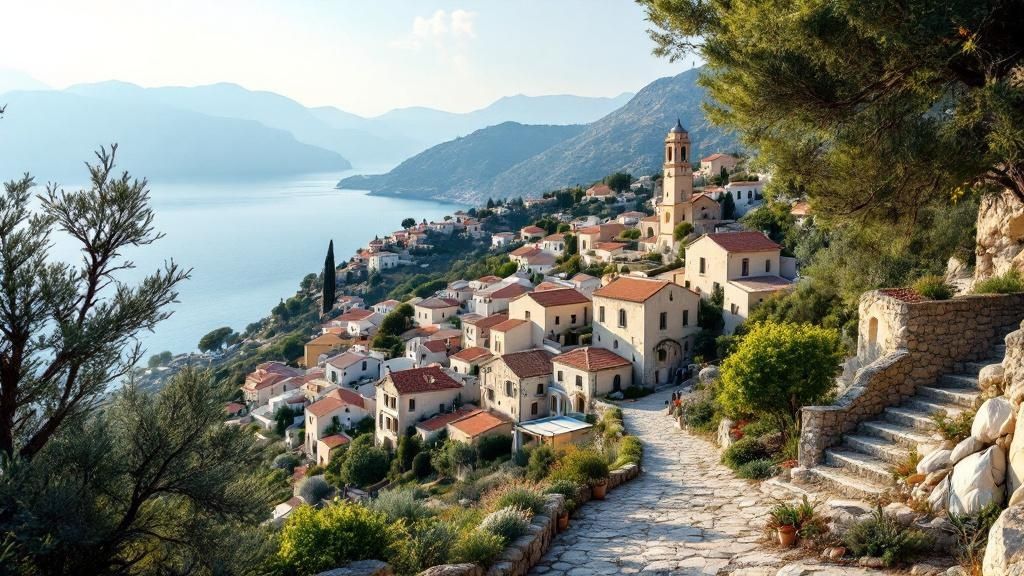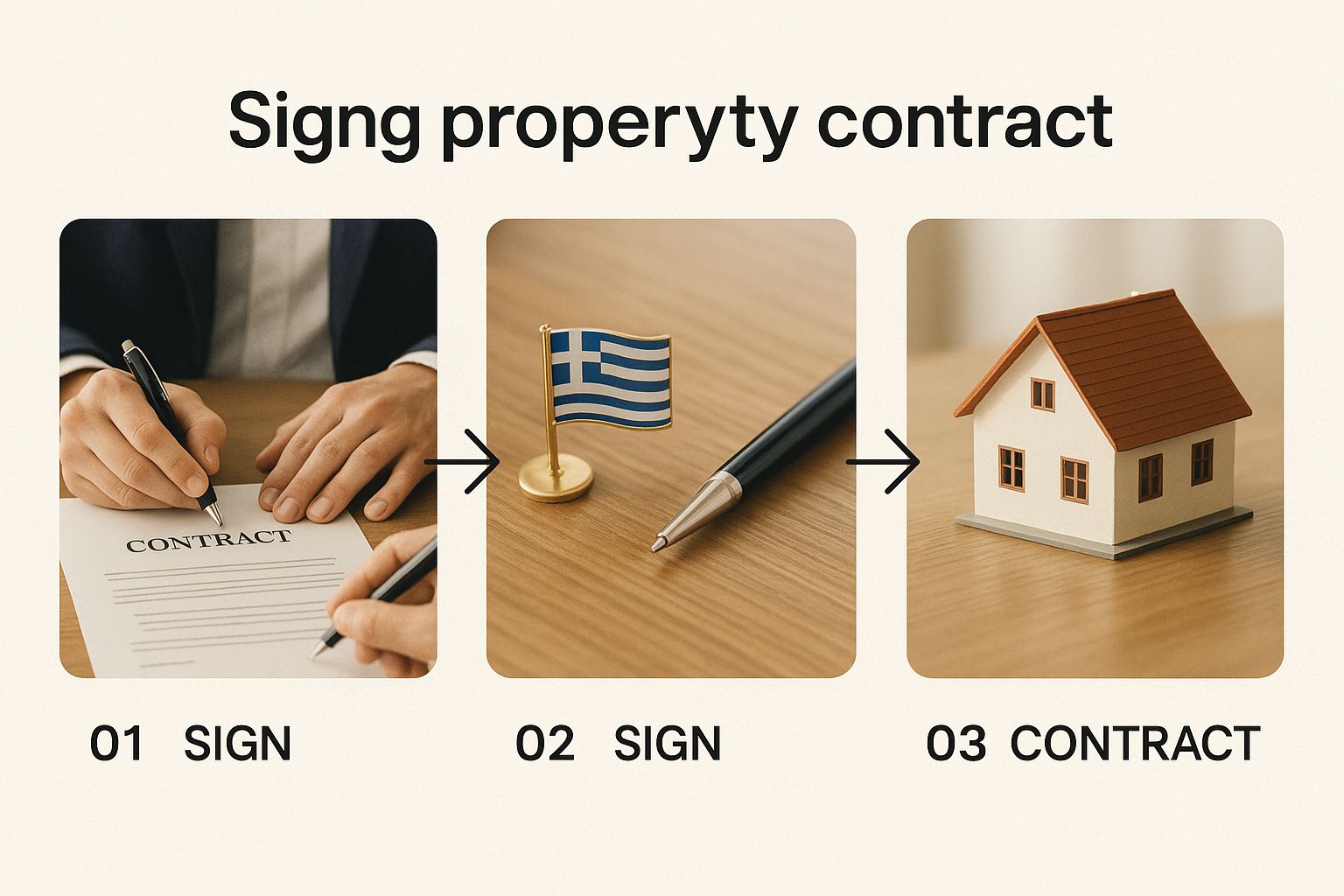The dream to buy a house in Greece cheap is very much alive, but for astute investors, the definition of “cheap” has evolved. Forget the romanticised notion of a €20,000 stone ruin demanding a fortune in renovations. Today, securing a cheap home is about identifying exceptional value in a market that remains one of Europe’s most compelling.
It’s about making a strategic, data-driven investment in a location with tangible growth potential.
The Evolving Reality of Greek Property Value
For sophisticated international investors, the narrative of the Greek property market is one of impressive recovery and sustained opportunity. The key insight is that while prices are on an upward trajectory, they began from a very low base. This means significant headroom remains for capital appreciation.
The objective is not to hunt for the absolute lowest-priced property. It is to acquire a home whose intrinsic value—in terms of lifestyle, location, and future appreciation—far exceeds its price tag, particularly when benchmarked against other Mediterranean hotspots.
This market is no longer a monolith. The strategy has shifted from a blanket approach to one that demands a more nuanced, location-specific perspective. While prime villas in Mykonos and Santorini will always command premium prices, incredible value is being unlocked daily in other, equally beautiful regions.
Shifting Focus Beyond the Postcard Islands
The most successful buyers right now are looking past the obvious choices. Mainland regions, revitalised city neighbourhoods, and the lesser-known islands are the new frontiers for finding genuinely affordable Greek real estate.
“The Greek market is evolving,” notes Nick Marr, founder of Homesgofast.com. “Buyers are looking beyond the postcard islands and finding incredible value in mainland regions and reviving city neighbourhoods. The key is to know where to look.”
This modern approach requires a deeper dive into regional micro-markets. It’s about discerning the difference between a sleepy island village perfect for a summer holiday home and an up-and-coming urban apartment poised to deliver strong rental yields.
Understanding the Upward Trend
Recent data from the Bank of Greece substantiates this positive momentum. Residential property prices in Greece’s urban centres saw a significant 6.19% year-on-year increase in the first quarter (or 3.53% after inflation).
This growth is not uniform across the country, which is precisely where the opportunity lies. Thessaloniki, for example, recorded a remarkable 10% annual rise, while Athens experienced a more moderate but still healthy 5.47% increase. This activity, fuelled by both domestic and foreign buyers, indicates a market firmly in a recovery phase.
To gain a clearer perspective on historical price movements, you can explore more detailed analysis of Greek property price history to inform your investment strategy.
Let’s examine a breakdown of current market dynamics.
Recent Greek Property Price Trends at a Glance
| Region | Nominal Annual Price Increase | Key Drivers |
|---|---|---|
| Thessaloniki | ~10% | Major infrastructure projects, university population, and rising tourism. |
| Athens | ~5.5% | Strong foreign investment, short-term rental demand, urban regeneration. |
| Cyclades (non-prime) | ~6-8% | Buyers seeking value away from Mykonos/Santorini, digital nomad interest. |
| Crete (regional) | ~7% | Year-round tourism, established expat communities, diverse property types. |
| Ionian Islands | ~6.5% | Strong appeal to UK/Italian buyers, yachting tourism, holiday home market. |
As the table illustrates, growth is widespread but varies regionally, offering diverse entry points for different investor profiles.
Despite these gains, homes in Greece remain significantly more affordable than in many Western European nations. This price differential makes it an incredibly attractive proposition for investors seeking affordable properties with clear potential. For a wider view, our guide on finding cheap homes in Europe places Greece’s value proposition into a broader context.
The current market is defined by calculated opportunity. Success no longer stems from chasing yesterday’s bargains but from identifying tomorrow’s hotspots. It’s about recognising that “cheap” is relative and that the best investments fuse an accessible price point, an exceptional lifestyle, and a clear trajectory for future growth.
Discovering Greece’s Affordable Property Hotspots
If your objective is to buy a house in Greece cheap, your initial strategic move is to look beyond the archetypal islands of the Cyclades. The global renown of Santorini and Mykonos is reflected in their property prices. The real value—the kind that discerning investors and lifestyle seekers pursue—is found elsewhere.
Your treasure map leads to the mainland and the quieter, less-trafficked Greek islands. These are locales that offer an authentic way of life, substantially lower entry costs, and significant potential for capital appreciation.

This is not a compromise on beauty for the sake of budget. It is a strategic decision. It’s about sourcing that traditional stone house in the Peloponnese or a modern flat in a resurgent city that satisfies both your lifestyle aspirations and your financial criteria.
Let’s delve into the specific regions that should be on your radar.
The Untamed Beauty of Epirus
Tucked away in the northwestern corner of Greece, Epirus is a land of dramatic mountains, turquoise rivers, and a rugged coastline overlooking the Ionian Sea. It remains one of the country’s most underrated regions, which translates to exceptional value for money.
Here, you’ll find everything from rustic stone houses in mountain villages like Zagori to coastal apartments near the charming towns of Parga and Syvota. For those seeking to escape the crowds, Epirus delivers a truly authentic Greek experience. The investment thesis is simple: secure a position before the wider market takes notice.
The Peloponnese: A Diverse and Accessible Peninsula
Connected to the mainland by the narrow Isthmus of Corinth, the Peloponnese is a vast, historically rich peninsula with incredibly varied landscapes. Its sheer size means its property markets differ wildly from one area to another, creating numerous pockets of affordability.
- Messinia: In the southwest, areas around the city of Kalamata offer fertile land, gorgeous beaches, and a growing community of expats. You can find olive groves with small farmhouses or seaside villas at prices far below the more famous islands.
- Arcadia: This is the mountainous heart of the Peloponnese, perfect for buyers looking for rustic charm and solitude. Its villages are filled with old stone houses that are ideal renovation projects, allowing you to buy a house in Greece cheap and add your own touch—and significant value.
- The Mani Peninsula: Famous for its unique stone tower houses, this southern tip has a distinct architectural heritage. While some spots are gaining popularity, many inland villages still have properties for sale at surprisingly low prices.
The most compelling advantage? The Peloponnese is easily accessible from Athens, making it a practical choice for both a holiday home and a permanent residence.
Crete: Beyond the Tourist Trail
As Greece’s largest island, Crete is practically a country in itself. While the resort towns along the northern coast can be expensive, the secret is to look south and head inland. The best bargains are hidden along the southern coast and in the foothills of the White Mountains.
Here you’ll find traditional village houses, often with a small garden or courtyard, that require some modernising but are priced accordingly. These homes are perfect for buyers who want to become part of a real Cretan community, far from the seasonal tourist rush. The opportunity to create your dream home for a fraction of what a new build would cost is immense.
The real opportunity in the Greek market now lies in diversification. An investor might secure a high-yield apartment in Thessaloniki for rental income while also purchasing a renovation project in a quiet Cretan village for personal use. This balanced approach captures both cash flow and lifestyle value.
Urban Hotspots: Athens and Thessaloniki
For those focused purely on investment returns, Greece’s two largest cities are where the action is. The hunt to buy a house in Greece cheap is increasingly leading investors to urban neighbourhoods undergoing significant revival.
Recent data indicates that apartments between 76 and 100 square metres are in high demand. In many working-class districts of Athens and Thessaloniki, rental yields have climbed to an impressive 5.5% to 7%. This demand is driven by a lack of social housing, meaning affordable private properties can generate excellent rental income and appreciate in value as these areas continue to gentrify.
These cities offer a different kind of investment—one built on strong rental demand, a vibrant year-round economy, and ongoing infrastructural upgrades. An apartment in a neighbourhood like Kypseli in Athens or Ano Poli in Thessaloniki could be a shrewd, affordable, and high-performing asset for your portfolio.
The Greek Property Purchase Process: A Step-by-Step Guide
So, you have identified a property. Excellent. But securing an affordable house in Greece is more than a handshake and a payment. It is a structured journey, and understanding the road ahead is absolutely critical, especially if you wish to buy a house in Greece cheap and without unforeseen complications.
The Greek system is structured to protect both buyer and seller. The process is designed to ensure the property you are acquiring is ‘clean’—free from debts, legal claims, or the infamous illegal building extensions. This is a crucial safeguard, particularly with older or inherited homes that often come with a tangled history. Let’s walk through the exact procedure.
This infographic breaks down the key milestones on your path to ownership.

As you can see, appointing a lawyer and obtaining a tax number are the foundational first steps upon which the entire transaction is built.
Assembling Your Professional Team
Before you even consider making an offer, your first and most important action is to hire an independent, reputable lawyer (a dikigoros). Consider your lawyer as your personal champion in this process; they work exclusively for you, verifying the property’s legal standing from top to bottom.
A crucial piece of advice: never use a lawyer recommended by the seller or their agent. It represents a significant conflict of interest.
You will also require a public notary (a symvolaiografos). This individual is a government-appointed official who remains neutral. Their role is to draft the final contract, witness the signing, and ensure every legal detail is correctly filed and registered. While your lawyer protects your interests, the notary ensures the transaction is 100% legal.
Critical First Steps for Foreign Buyers
To execute almost any financial or legal act in Greece, you need to arrange two things immediately. These are not optional—they are the bedrock of your property purchase.
- Obtain a Greek Tax Number (AFM): The Arithmos Forologikou Mitroou (AFM) is your personal tax identification number. You will need it for everything: buying the house, opening a bank account, setting up utilities, and paying taxes. Your lawyer can typically obtain this for you with a power of attorney, saving you considerable administrative burden.
- Open a Greek Bank Account: A local bank account is essential. You will use it to transfer the purchase funds and to pay ongoing costs like property taxes and bills. It also provides a clear financial trail, which is a legal requirement.
Complete these two tasks as soon as you are serious about buying. Any delay here can bring the entire process to a grinding halt.
Due Diligence and Making an Offer
Once your team is in place and you’ve selected a property, the real investigative work begins. This is the due diligence phase, where your lawyer truly earns their fee and protects your investment from potential disaster.
A common pitfall for international buyers is underestimating the importance of a thorough legal check. Unregistered extensions, outstanding debts tied to the property, or unclear ownership titles are surprisingly frequent issues with older Greek homes. A diligent lawyer will uncover these before you are financially committed.
Your lawyer will conduct a deep dive at the local Land Registry, which will either be the old Ypothikofilakeio or the newer Cadastral Office (Ktimatologio). They are checking for a few key things:
- Clear Title: To confirm the seller is the legal owner and has the right to sell.
- No Encumbrances: To ensure the property is free of mortgages, liens, or other third-party claims.
- Building Compliance: To verify that the house as it stands matches the official building permits. If there are any illegal structures, the seller must regularise them before the sale can proceed.
With a clean bill of health from your lawyer, you can confidently make an offer. If it’s accepted, you’ll sign a preliminary agreement and pay a deposit, typically around 10% of the purchase price. This secures the property for you and takes it off the market while the final contract is drafted.
Finalising the Deal and Ancillary Costs
The final step is signing the purchase contract (symvolaio) at the notary’s office. The notary will read the entire contract aloud to ensure all parties understand what they are signing. Once signed, the funds are transferred, and you are officially the new owner.
However, the price on the contract is not the final amount you will pay. You need to budget for additional closing costs, which typically add another 8% to 15% to the property’s price.
Key Closing Costs Breakdown
| Cost Item | Typical Percentage/Fee | Notes |
|---|---|---|
| Property Transfer Tax | 3.09% | A flat rate on the contract price. This is much lower than it used to be, a significant benefit for buyers. |
| Lawyer’s Fee | 1% – 1.5% (+VAT) | This covers your legal representation for all due diligence and counsel. |
| Notary’s Fee | 1% – 1.5% (+VAT) | This is for drafting, witnessing, and certifying the final contract. The fee is set by the state. |
| Land Registry Fee | ~0.5% – 0.7% | For officially registering your new title deed. |
| Agent’s Commission | 2% – 4% (+VAT) | Paid to the real estate agent for sourcing the property. |
After the signing ceremony, your lawyer takes the new title deed and registers it at the Land Registry. Your ownership is only fully and officially secured once this registration is complete. By understanding this roadmap, you can confidently navigate the process and secure your own slice of paradise in Greece.
Financing Your Purchase and The Golden Visa Option
So, you’ve identified your ideal property. Now, how do you pay for it? Arranging the finance to buy a house in Greece cheap differs from securing a mortgage in your home country. Furthermore, once the funds are in place, your investment could do more than just secure a home—it could unlock residency through Greece’s popular Golden Visa programme.
https://www.youtube.com/embed/mU69g6Ao47A
For most international buyers, particularly those from outside the EU, approaching a Greek bank for a mortgage is a significant challenge. Lenders are inherently cautious about approving loans for non-residents who lack a local credit history or income sourced in Greece.
It is not entirely impossible, but it is an arduous path. That is why most astute foreign buyers employ creative financing routes that offer greater certainty.
Smart Ways to Fund Your Greek Home
By far, the most common and effective method is a cash purchase. Utilising your savings completely bypasses the complexities of cross-border lending. It also positions you as a far more attractive buyer during negotiations, often providing the leverage to secure a better price.
Another excellent strategy is to refinance a property you already own in your home country. This allows you to tap into the equity you have built, creating a cash pot for your Greek purchase. The primary advantage? You are dealing with your own domestic banking system, which is almost always a smoother and faster process.
If you do require a loan, do not go it alone. A specialist international mortgage broker is your best asset. These experts have established relationships with lenders who understand the intricacies of financing property in Greece for foreigners. They know how to navigate the bureaucracy and package your application for the best chance of success.
Considering a mortgage? It’s crucial to understand the required deposit. You can see how Greece compares with other popular destinations in our guide to minimum deposits for overseas mortgages.
Turn Your Property into a European Foothold with the Golden Visa
For non-EU citizens, buying a property in Greece represents more than just a place in the sun—it can be your gateway to Europe. The Greek Golden Visa programme is one of the most popular residency-by-investment schemes on the continent for good reason.
It offers a five-year residency permit to you and your family upon making a qualifying real estate investment. This permit is renewable as long as you retain the property and grants you visa-free travel across the entire 27-country Schengen Area.
The Golden Visa elevates a simple property purchase into a strategic life asset. It provides mobility, security, and a permanent foothold in Europe, dramatically boosting the value of your investment.
The investment rules were updated recently and now depend on the property’s location, creating a tiered system.
Greek Golden Visa Investment Thresholds by Zone
Before you buy, it is essential to understand how the Golden Visa investment tiers work, as they directly influence property prices and demand in different parts of the country.
| Geographic Zone | Minimum Investment Amount | Key Areas Included |
|---|---|---|
| Zone A (High Demand) | €800,000 | Athens (North, Central, South), Thessaloniki, Mykonos, Santorini, and islands with over 3,100 inhabitants. |
| Zone B (Moderate Demand) | €400,000 | Specific municipalities not included in Zone A, offering a mid-tier entry point. |
| Zone C (Standard) | €250,000 | All other regions of Greece not specified in Zones A or B. This includes many affordable areas perfect for finding value. |
This tiered system is a major force shaping the market. The Golden Visa has been a huge driver of demand, particularly from non-EU buyers seeking a blend of lifestyle and residency benefits.
In fact, projections show Greece’s housing market is on track to grow from around $1.28 trillion to $1.56 trillion by 2029, largely fuelled by this steady international interest. With demand for 35,000 new homes each year easily outpacing the 30,000 units being built, prices are expected to hold firm.
Managing Your Greek Home After the Purchase
Receiving the keys to your Greek home is a significant milestone, but it marks the beginning of a new chapter, not the end of the story. The real journey begins now. Owning a home in Greece, whether for holidays or as a strategic investment, comes with its own set of responsibilities. Executing these next steps correctly is what turns your decision to buy a house in Greece cheap into a long-term, stress-free success.
Think of the transition from buyer to owner as a practical checklist. You will need to get a handle on local taxes, set up your utilities, and generally make the property operational. A little preparation here goes a very long way.
Settling In: Your Essential First Steps
Once the ink is dry and the property is officially yours, the first task is to make it liveable and legally compliant. This means tackling a few key administrative duties that every new homeowner in Greece faces.
- Getting Utilities Connected: Your lawyer can often provide guidance, but you will need to transfer the electricity (DEH) and water (EYDAP in Athens, or your local municipal provider) into your name. You will definitely need your AFM (tax number) and a copy of the final property contract for this.
- Arranging Property Insurance: This is not just a good idea; it’s essential. Comprehensive home insurance protects your new asset from common risks in Greece like earthquakes and fires, not to mention theft and liability. The peace of mind alone is worth the premium.
- Understanding the Annual Property Tax (ENFIA): Every property owner in Greece pays an annual tax called ENFIA (Enifios Foros Idioktissias Akiniton). The amount is based on factors like the home’s size, location, age, and its “objective value” as set by the tax office. Your accountant will be your most valuable advisor here, handling the filing each year.
With the paperwork sorted, it is smart to consider security. For those looking for affordable and effective options, it’s worth exploring the latest DIY home security systems which are perfect for holiday homes.
Maximising Your Investment: Rental Strategies
For many who buy a house in Greece cheap, the end goal is generating rental income. The Greek rental market is dynamic, but it is effectively split into two distinct worlds, each with its own rules and rewards.
Your choice between a steady long-term lease or lucrative short-term holiday lets will completely shape how you manage the property.
A key insight from our work at Homesgofast.com is that the most successful overseas investors are those who plan their management strategy before they even complete the purchase. Knowing whether you’ll manage it yourself from afar or hire a local professional dictates the type of property you should even consider buying.
A long-term rental provides the comfort of a consistent monthly income and a single tenant. This is often the less demanding path, especially if you are not living in Greece yourself.
On the other hand, short-term holiday lets via platforms like Airbnb and Vrbo can yield much higher returns, especially during the tourist season from May to October. But this comes with the constant churn of guests, cleaning, marketing, and communication. Be aware that Greece has specific regulations for this: you must register the property on a government platform and display your registration number (AMA) on every listing.
Property Management and Remote Ownership
If you do not plan to live in Greece full-time, hiring a reliable property manager is one of the smartest investments you can make. A good management company is worth its weight in gold, handling everything from finding tenants and collecting rent to fixing leaky taps and keeping your property in top condition.
Their fees are usually a percentage of the rental income, but this is often easily covered by the superior occupancy rates and zero-hassle experience they deliver. For those managing from abroad, technology is a huge help. You can learn more about the tools available in our guide on cloud-based platforms that help you manage rentals remotely.
Living in Greece: Residency and Integration
If your new Greek home is purely for personal use, your focus will be less on rental yields and more on settling into the lifestyle. For non-EU citizens who did not use the Golden Visa route, you will need to explore other residency permits if you wish to stay longer than the 90 days a standard tourist visa allows.
Beyond the legalities, integrating into your new community is what truly turns a house into a home. Learning a few basic Greek phrases, shopping at the local markets, and participating in village festivals will enrich your experience immeasurably. It is also vital to understand the healthcare system. EU citizens can use their EHIC card for state healthcare, while others will need to arrange private health insurance as part of their residency application.
Getting the post-purchase management right is the final, crucial piece of the puzzle. It’s what ensures your affordable Greek dream provides joy and value for many years to come.
Frequently Asked Questions on Buying Property in Greece
Even with the best roadmap, questions are bound to arise on your journey to owning a house in Greece. This section tackles the most common queries we hear from international buyers, providing direct, practical answers to help you move forward with confidence.

Let’s clarify some of the key concerns that often arise, from obtaining finance and identifying hidden costs to the classic dilemma of a new-build versus a renovation project.
Can a Foreigner Get a Mortgage in Greece?
Frankly, it is challenging but not impossible. Greek banks are notoriously cautious about lending to non-residents, particularly if you do not have an income stream in Greece. This makes securing a direct mortgage an arduous path for most international buyers.
The simpler, more common route is to arrange finance in your home country, use cash, or work with a specialist international mortgage broker. These brokers have established relationships with lenders who understand cross-border transactions and can navigate the bureaucracy.
If you are determined to try a Greek bank, be prepared for a lengthy process. You will need a substantial deposit and a flawless financial portfolio to even be considered.
What Are the Hidden Costs of Buying a House?
The listing price is merely your starting point. You must budget for an additional 8% to 15% of the property’s value to cover all closing costs. Miscalculating this is the quickest way to exceed your budget.
Here’s a breakdown of what to expect:
- Property Transfer Tax: A flat tax of 3.09% on the declared value.
- Lawyer’s Fee (Dikigoros): Usually 1% to 1.5% of the price, plus VAT. This is for all crucial legal checks.
- Notary’s Fee (Symvolaiografos): About 1% to 1.5%, plus VAT, for drafting and certifying the final contract.
- Land Registry Fees: Roughly 0.5% to 0.7% to make your ownership official.
- Real Estate Agent Commission: Typically between 2% and 4% of the sale price, plus VAT.
Knowing these figures from the outset is key to a smooth, financially sound purchase.
Nick Marr, founder of Homesgofast.com, advises, “Prospective buyers should always request a detailed breakdown of all anticipated fees from their lawyer early in the process. This transparency prevents last-minute surprises and ensures your budget for an affordable Greek home remains realistic.”
Is It Better to Buy a New Build or a Renovation Project?
This decision comes down to your personality, budget, and appetite for a project. A renovation project is often the most direct path to buy a house in Greece cheap. It offers a blank canvas for customisation but be warned—it can also bring unforeseen costs and delays.
A new-build, on the other hand, provides modern comforts, energy efficiency, and fewer immediate maintenance headaches, but you will pay a premium for that convenience.
For buyers laser-focused on value, an older home requiring work often presents the best financial proposition. However, its success is entirely contingent on sourcing a trustworthy team of builders and architects to bring your vision to life.
How Long Does the Purchase Process Take?
From the moment your offer is accepted to holding the keys, the buying process in Greece generally takes between two and three months.
This timeline can extend or contract based on several factors. The efficiency of your legal team, how quickly you obtain your AFM tax number and open a bank account, and the property’s own legal history all play a role.
If you are fortunate and the property has a clean title with no legal snags, you could be finished in as little as six to eight weeks. However, if due diligence uncovers issues like unregistered buildings, the process will pause until the seller rectifies them.
At HomesGoFast.com, we connect you with properties in Greece and over 50 other countries. Start your search today and find your perfect international home.
👉 Explore our listings of homes for sale in Greece
About Homesgofast.com
HomesGoFast.com is a leading international property website, established in 2002, helping homeowners, real estate agents, and developers reach overseas buyers. Featuring thousands of listings from over 50 countries, the platform connects global property seekers with homes, apartments, villas, and investment opportunities worldwide.
Looking for expert mortgage guidance? Get international property mortgage advice here:
👉 https://homesgofast.com/mortgages-overseas/
Explore more overseas homes for sale at our global partner site:
👉 https://homesgofast.com/overseas-property/
Looking to sell real estate to foreign buyers
https://homesgofast.com/sell-overseas-property/




